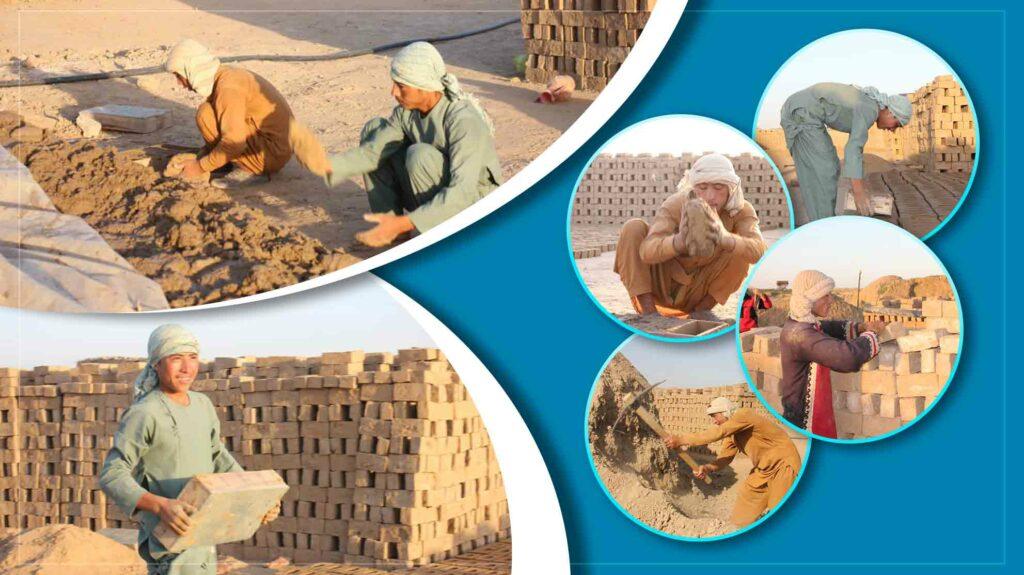SHIBERGHAN (Pajhwok): Some children involved in hard work in Shiberghan City, the capital of northern Jawzjan province, have been worried about their uncertain future and asked the government to provide suitable work and education opportunities for them.
More than four decades of war in the country have left unfortunate effects on the lives of Afghans resulting in bad economic conditions, millions of widows and orphans, migrations and others were the main impacts of four decades of war.
Economic poverty and the loss of men in the family have caused children to do hard work and support their families.
We have to do this grueling work: Child labourer at brick kilns
Tahir, 16, who works at one of the brick kilns to support his family, told Pajhwok Afghan News that he worked for the past five years in one of the brick kilns field in Shiberghan.
His father was killed and currently looks after a 10-member family, said: “I work here, so that my family did not keep hungry, I would be happier to go to school and have a decent job in the future.”
He said he earned 450 afs for 1,000 bricks which could be completed in two days.
Tahir who is uncertain about his future asked the Islamic Emirate of Afghanistan (IEA) government to provide him and other children like him with education and decent work opportunities. But it is not only Tahir who is busy doing hard work due to economic problems, but 15-year-old Hussein is another boy who is busy working in a bricks kiln in Sheberghan due to economic poverty.
Hussain is responsible for feeding twelve people in his family because according to him, his father is sick and cannot do the work.
He worked fast and talked while working, saying that he worked 12 hours a day in this clay kiln and earned 450 afs for one thousand bricks.
Hussain is also very interested in learning and is very worried about his unknown future because he cannot go to school and study.
He always dreamed of becoming a teacher in the future and said: “I have no other option and come here, we should be supported to study, I am very sad that I cannot go to school, cannot study and to have a good future.”
But Ali, 15, a boy who lost his father four years ago and now has the responsibility of supporting his eight-member family, is also busy working in a bricks kiln. He said this was back-breaking work, but he had to do it.
He said: “Before my father died, I was in the fourth grade of school and I was the topper in my grade, but when my father died, I started working from polishing shoes, but when it did not work, I started work in a bricks kiln, because I earned 50 rupees a day polishing shoes.”
Would have never let my son work if I was healthy: father of a labourer child
Abdullah, the father of Hussain who is one of the child labourers working in a bricks kiln, said if he was not sick he would never let his son to work instead he would sent him to the school.
He is worried about the future of his children and said: “I want the IEA to pay attention towards the education and training of our children.”
Children’s demands should be met: Expert
Mawlavi Samaruddin, one of the Ulemas in Jawzjan, said, children involved in hard labour needed greater attention, adding that different institutions should provide support to these children.
He said: “Islam has stressed that children should live and grow in a proper environment and should be kept away from hard and difficult work.”
He said Working at a young age can harm children’s physical and mental health and deprive them of the right to education.
Efforts underway to address child labour issue: officials
Qari Noorullah Musafir, head the Work and Social Affairs Department, told Pajhwok Afghan News that currently over 14,000 children in Jawzjan are involved in hard labour.
He said: “We are trying to find a suitable job for them, either in terms of education or other sectors, so that they can get rid of the problem.”
nh







GET IN TOUCH
NEWSLETTER
SUGGEST A STORY
PAJHWOK MOBILE APP